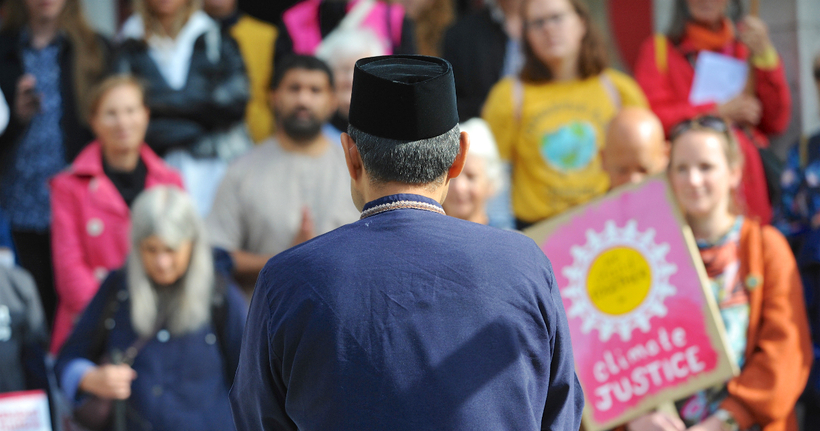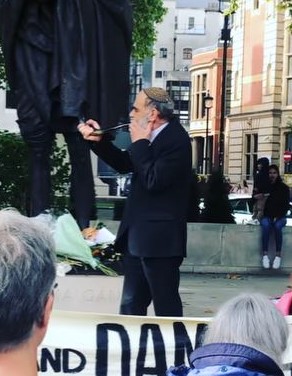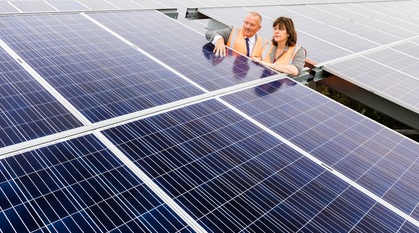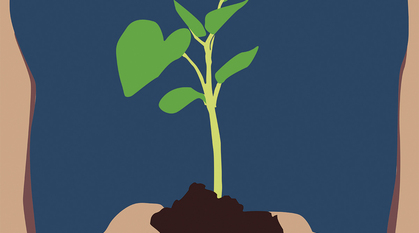Silence and hope: a witness to the impact of climate breakdown
Last week was Loss and Damage Action Day. Anna Lewis reflects on the need for an international fund.

On a cool day in central London, I stood in Jubilee Gardens holding a cardboard sign asking passers-by to sign a petition for loss and damage funding. Nearby, faith leaders stood in a circle, leading a silent vigil.
Parents with pushchairs strolled past, some tugged to a stop by curious children. Opposite the park, Shell's headquarters loomed above us, rows of small windows failing to give any insight on the destructive work taking place inside.
We were gathered to mark Loss and Damage Action Day 2022. Other groups met across the UK, from Edinburgh to Truro, in events organised by local Quakers, members of Global Justice Now, or other faith groups. For me, the day was significant because, three weeks into my new job as Campaigns Coordinator, I was attending my first in-person event with Friends campaigning to make polluters pay for loss and damage.
Addressing loss and damage
Loss and damage refers to the impacts of climate change that have not been avoided or adapted to. These include extreme weather events like hurricanes and cyclones, as well as slower-moving disasters like desertification and rising sea levels. It's about people losing their homes, their ways of making a living, their schools, sometimes even their own lives – all in a climate crisis they did not cause.
Although there is so much pain to these losses besides the financial cost, funding is one clear way to redress some of the damage. According to a 2018 report, the economic cost of loss and damage is expected to reach $290-580 billion a year by 2030 in Global South countries alone.
Taking action
Just the day before our action, Denmark announced a pledge of £12m towards loss and damage, joining Scotland as the only other country to have pledged funding. These (relatively tiny) pledges are an important step towards what campaigners are calling for: an international loss and damage fund under the United Nations Framework Convention on Climate Change (UNFCCC).
Loss and Damage Action Day was an important chance to stand in solidarity with those living with the worst impacts of climate breakdown, and to call on wealthy countries and fossil fuel corporations to pay up for the loss and damage they continue to knowingly cause.
Our action began at St John's Church with a prayer, followed by a reading from the Qur'an and a speech on the Buddhist belief in interconnectedness. With plenty to think about, we moved to Jubilee Gardens to hold a silent vigil for the victims of climate breakdown.
Witness as a living record
Watching the people walking past, it was easy to imagine seeing the office block opposite as just another tall, faceless building, and to see the industry that went on inside as just another part of our society.
I've been thinking recently about the word witness, because the department I've joined at Quakers in Britain is called Quaker Peace & Social Witness. For Quakers, witness has a specific meaning to do with acting as spiritually led, but I've been reflecting on the everyday meaning of the word too.
When we witness something, we don't just passively see it. We become a living record of it, able to bring about justice by sharing the truth of what we've seen.
By holding a vigil outside the Shell headquarters we made clear that we are not just seeing, but witnessing the destruction Shell and similar companies are wreaking on those at the sharp end of climate change. After the vigil, we moved to another site in London where we could bear witness to a lack of action for climate justice: the small patch of heatwave-scorched grass outside Parliament.
A note of hope
In Parliament Square we heard from more faith leaders and climate justice campaigners. Even busy MP Caroline Lucas managed to escape Parliament for a moment to speak.
Our last speaker, Rabbi Jonathan Wittenberg, told us about the upcoming Jewish New Year, a time of reflection and repentance that can also be seen as the birthday of the world. He demonstrated how, on this holiday, a ram's horn is used to play a series of notes to represent crying over the breaking of the world's peace, followed by a long note that means hope – something we all need when witnessing the challenges our world is facing.
It's through action that I find hope in the face of the climate crisis. So I'm grateful to everyone across the country who came together last week to mark Loss and Damage Action Day – and looking forward to joining more actions in future.
If seeing others take action has inspired you, you can sign the Make Polluters Pay petition to support the loss and damage campaign, and join our online Woodbrooke course exploring faith and climate justice to learn more about climate justice.



